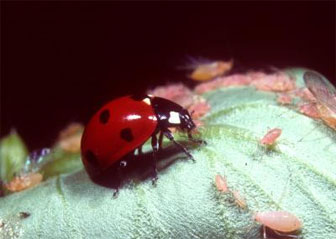Biodiversity extinction crisis will disrupt important ecological services warns study
Biodiversity extinction crisis will disrupt important ecological services warns study
mongabay.com
October 25, 2006
Loss of biodiversity will have an ecologically-costly impact according to a study published in the journal Nature this week.
The new study, headed by a biologist at the University of California, Santa Barbara (UCSB), found that species extinction will reduce nature’s ability to maintain ecological balance and “services” such as water filtration, nutrient cycling, and pollination.
 The ladybug beetle is part of a synergistic “team” of three aphid predators that help alfalfa farmers in the Midwest. According to a news release from UCSB:
Courtesy of Bradley Cardinale |
“By combining the results of more than a hundred studies performed over two decades, we were able to conclusively show that the extinction of species from our planet will change the way pests and diseases are controlled, organic wastes are broken down and recycled, food is produced by ecosystems, and water is purified,” said Bradley J. Cardinale, leaf author and an associate professor in the Department of Ecology, Evolution and Marine Biology at UCSB.
“Until recently, scientists knew a lot about the causes of extinctions, but surprisingly little about their consequences,” said Diane S. Srivastava, second author of the paper and a zoology professor at the University of British Columbia.
The researchers said with current extinction rates at thousands of times the normal background rate, one-third to one-half of all the species on the planet are expected to disappear in the next 100 years. Habitat loss, invasive species, and climate change are cited as primary factors in extinction.
“Our study shows that biodiversity matters,” explained Srivastava. “Ecosystems with more species function better, that is, they are more efficient in moving energy and matter. In practical terms, this means that diverse ecosystems are better at, for example, controlling pests, breaking down organic matter, and absorbing carbon dioxide, a greenhouse gas.”
“We now have good evidence that the number and type of species on the planet regulate services that affect humanity,” said Cardinale. “If we value these services, then we need to protect biodiversity.”
Cardinale said the best way to preserve biodiversity is through a system of protected areas, especially biologically rich areas known as “hot spots”.
“We could save a lot of species with only small areas, by putting aside hot spots,” he concluded.
This article is based on a news release from the University of California at Santa Barbara.














